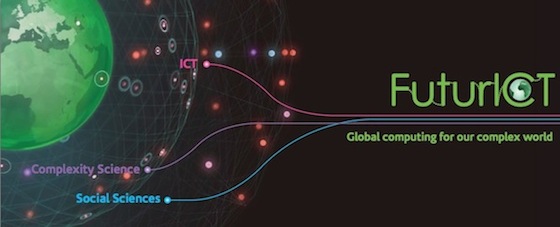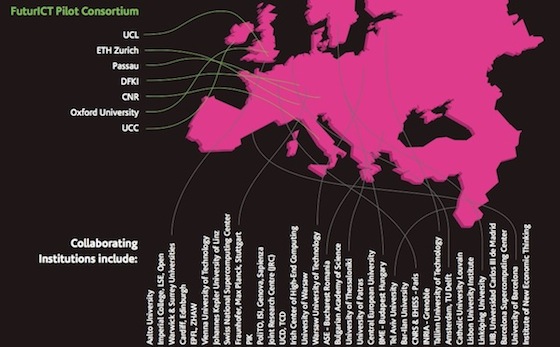28 November, Geneva, Switzerland – Daniel Stauffacher, Chairman, ICT4Peace Foundation, participated as a member of the Futurict project team in the EU FET Flagship Pilots Midterm Conference, 24-25 November 2011, Warsaw, Poland. This project is co-lead by Prof. Dirk Helbing, ETH Zürich and Prof. Steven Bishop, University College, London along with approximately 300 research teams all over the world. ICT4Peace has been supporting the efforts of Prof. Helbing and Prof. Bishop to build this important project since spring 2010.
The EU FET Flagships are ambitious large-scale, science-driven, European research initiatives that aim to achieve a visionary goal. The scientific advance should provide a strong and broad basis for future technological innovation and economic exploitation in a variety of areas, as well as novel benefits for society. The six selected FET Flagship Pilots were officially launched by EU Vice-President Neelie Kroes in May 2011 during the fet11 Conference in Budapest. The Midterm Conference in Warsaw was an opportunity for the six Flagship Pilots (FuturICT, Graphene, Guardian Angels, The Human Brain Project, EPFL Lausanne, ITFoM and RoboCom) to promote their projects in front of approximately 250 experts, including EC, national funding agencies and other stakeholders.
What is FuturICT?
We have built particle accelerators to understand the forces that make up our physical world. Yet, we do not understand the principles underlying our strongly connected, techno-socio-economic systems. We have enabled ubiquitous Internet connectivity and instant, global information access. Yet we do not understand how it impacts our behaviour and the evolution of society. To fill the knowledge gaps and keep up with the fast pace at which our world is changing, a Knowledge Accelerator must urgently be created. For this, the FuturICT flagship project will promote an interdisciplinary integration of natural, social, and engineering sciences with novel paradigms of information technology. This will produce the synergy effects required to address many of our 21st century challenges. After the age of physical, biological and technological innovations, FuturICT will lead Europe into the next era – a wave of information-driven social and socio-inspired innovations.
Globalisation and technological change have made our world a different place. This has created or intensified a number of serious problems, such as global financial and economic crises, political instabilities and revolutions, the quick spreading of diseases, disruptions of international supply chains, organised crime, international conflict and world-wide terrorism, and increased cyber-risks as well.
Although the creation of more and more interconnected systems and the pace of innovation in the area of information and communication technologies (ICT) have contributed to the above problems, future ICT can also be key to the solution. It can create unprecedented benefits for our economy and society, based on a whole range of new methods and innovations. For this, ICT must acquire the ability to flexibly adapt to the needs of society.
In this way, it can become a stabilising factor fostering transparency, trust, respect for individual rights, and opportunities for participation in social, economic, and political processes. This requires us to establish a new science of multi-level complex, global systems and a co-evolution of ICT with society, by bringing the best knowledge of experts on information and communication systems, complex systems and the social sciences together.
The vision of the FuturICT flagship project is to develop the capacity to explore and manage our future, based on a fundamental understanding of the institutional and interaction-based principles that make connected systems work well.
The methods and ‘Big Data’ needed for such a scientific endeavour are now becoming available: it is, therefore, time to make a ‘Big Science’ effort to couple methods and data with theories and models, like in the Human Genome Project. This endeavour should be open, because we need to prevent private monopolies of socio-economic data, and it should be federated, because joint interdisciplinary efforts are the only way to tackle humanity’s global challenges and ensure leadership in socio-inspired ICT innovations. The investments into the FuturICT project can benefit citizens and society in many ways: by promoting collective awareness of the impacts of our decisions and actions, by mitigating global problems and systemic risks, and by creating new possibilities to participate in social, economic and political affairs. In particular, FuturICT will create the basis for new spin-offs, business opportunities and jobs.
FuturICT is a visionary project that will deliver new science and technology to explore, understand and manage our connected world. This will inspire new information and communication technologies (ICT) that are socially adaptive and socially interactive, supporting collective awareness.
Revealing the hidden laws and processes underlying our complex, global, socially interactive systems constitutes one of the most pressing scientific challenges of the 21st Century. Integrating complexity science with ICT and the social sciences, will allow us to design novel robust, trustworthy and adaptive technologies based on socially inspired paradigms. Data from a variety of sources will help us to develop models of techno-socioeconomic systems. In turn, insights from these models will inspire a new generation of socially adaptive, self-organised ICT systems. This will create a paradigm shift and facilitate a symbiotic co-evolution of ICT and society. In response to the European Commission’s call for a ‘Big Science’ project, FuturICT will build a largescale, pan European, integrated programme of research which will extend for 10 years and beyond.
Why do we need it?
Today, society and technology are changing at a pace that often outstrips our capacity to understand and manage them. It seems that we know more about the universe than about our society. Therefore it is time to use the power of information to explore social and economic life on Earth and discover options for a sustainable future. As the recent financial crisis demonstrates, the systems that we have built to organise our affairs now possess an unprecedented degree of complexity and interdependence among their technological, social and economic components. This complexity often results in counter-intuitive effects driven by positive feedbacks that lead to domino-like cascades of failures. Neither the precepts of traditional science, nor our collective experience from a simpler past, adequately prepare us for the future. It is simply impossible to understand and manage complex networks using conventional tools.
We need to put systems in place that highlight, or prevent, conceivable failures and allow us to quickly recover from those that we cannot predict. We need this insight to help manage our financial markets but also to tackle other risks, such as flu pandemics, social instabilities, or criminal networks. At the same time, policymakers are currently faced with major decisions of how to plan the general infrastructure of services to cope with the demands of the future, and what is more, to do so in a sustainable manner. The same decisions are also posed to individuals who wish to improve their own lives. Thus now is the time to create a paradigm shift moving from a focus on the system components and their properties towards evaluating their interactions. These interactions are often hard to measure but create collective, emergent dynamics, which are characteristic of strongly coupled systems.
How will it work?
The FuturICT flagship project will align the research of hundreds of the best scientists in Europe through a 10 year, €1 billion research programme to develop new methods which integrate different scientific models, data and concepts. To build capacity, regional support will be developed alongside educational programmes for young researchers.
FuturICT will build a sophisticated framework for simulation, visualisation and participation, called the FuturICT Platform. A suite of models forming the Living Earth Simulator will power Observatories, to detect and mitigate crises plus identify opportunities in specific areas. These models will be driven, and calibrated, by data aggregated in real-time, which are gathered by a digital Planetary Nervous System. Both models and data will support the decision-making of policy-makers, business people and citizens, through a Global Participatory Platform, which is intended to facilitate better social, economic and political participation.
What will be the benefit?
The FuturICT project will produce benefits for science, technology and society by integrating previously separated approaches. ICT systems of the future will provide the social sciences with the datasets needed to make major breakthroughs in our understanding of the principles that make socially interactive systems work well. This, in turn, will inspire the design of future systems, made up of billions of interacting, intelligent components capable of partially autonomous decisions. One goal is the creation of a privacy-respecting, reputation-oriented, and self-regulating information ecosystem that promotes the co-evolution of ICT with society. The tremendous growth in social media, mobile applications, Open Data and Big Data will enable complexity science to tackle practical problems by uncovering laws of interaction and help us understand the implications of strong couplings, thereby forging a new science of global systems that are more resilient to disruptions.
Furthermore, FuturICT will produce outcomes that are relevant to society, creating systems that help decision makers assess the implications of alternative strategies. FuturICT’s Global Participatory Platform will thus provide something like a policy ‘wind tunnel’ where the consequences of decisions can be explored. Hence the project will create a focus on resilience and sustainability.
Exemplar, case studies will be performed in order to address major challenges such as smart cities or smart energy systems, but also build up our capacity to model systems and understand data. Additionally these studies will improve our understanding of over-arching, key concepts such as risk, trust, resilience and sustainability which are relevant to a wide range of systems, including ICT systems. Having all this new information in place will allow FuturICT to study interactions among society, technology, environment and the economy through interconnected Exploratories. This will allow us to create an Innovation Accelerator that will discover valuable knowledge in the flood of information, help to find the best experts for projects, and support the distributed generation of new knowledge, hence promoting innovation.
FuturICT will start an era of social innovation, sparking off novel, socially inspired technologies, spin-offs and whole new business areas.
Who is involved?
Active collaborations are now taking place among Europe’s top universities with hundreds of researchers engaged in the project. Hubs to support regional activities have been created in many European countries. FuturICT communities also exist in USA, Japan, China, and Australia. Individuals and a wide range of scientific organisations have expressed their explicit support, as have small and big businesses. Each supporter recognises the vital importance of securing funds for this area of research to build European expertise within an integrated project and create an innovation economy based on the digital revolution, while at the same time benefiting humanity. Affiliations with existing complementary projects are being established and new projects are being encouraged.
FuturICT: National Focus Areas and Responsibilities
Regional hubs have been set up in many countries to coordinate activities. Some of the collaborating institutes are shown; we envisage different institutes joining the project as it develops. In addition collaborations have started with e.g. Microsoft Research, IBM, Telecom Italia, Yahoo! Research, Disney Research and many others. Please see the website www.futurict.eu for the full list and details of the hubs.
Contacts
Prof. Steven Bishop UCL, FuturICT.eu Pilot Phase Coordinator, email: s.bishop@ucl.ac.uk
Prof. Dirk Helbing, ETH Zurich, Chair of FuturICT.eu Steering Committee, email: dhelbing@ethz.ch


